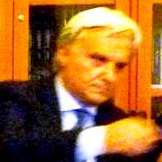Soprano Stefania Bonfadelli made a positive directorial debut in Martina Franca with Un giorno di regno, Verdi's second opera and his first comedy (or melodramma giocoso). To a libretto by Felice Romani, the work premiered at La Scala in Milan in 1840, where it was a total fiasco to the point that it took another 50 years for the composer to attempt another comedy – Falstaff – which ended his glorious career. Verdi was only 27 at the time he composed it, still working his way into an operatic career. Moreover, it came at a time of great grief in his life, caused by the death of his two children, and shortly after by his wife's in early 1840, a few months before the La Scala opening night.
Bonfadelli’s main concern was to present an opera still unknown, even to many opera buffs, which suffers from a poor performance tradition. She chose to stage it as a theatre-within-a-theatre in a present day setting. A playhouse is taken over by a theatre company whose members are trying to set up a play called Il finto Stanislao (The False Stanislaus), the alternative title of Verdi’s comedy.
It could all appear quite convoluted, nonetheless the continuous stage movement lent dynamism and energy to the performance. The scenery and costumes, also by Bonfadelli, were funny and appropriate, with plenty of props on stage to represent the confusion of a theatrical work in progress.
The original plot is as simple as a romantic opera can be. A couple of young lovers want to get married, but the girl's father, the Barone di Kelbar, expects her to marry an old friend of his, Signore della Rocca. In the meantime, the arrival of the King of Poland, Stanislaus, is announced, although he is actually the Cavaliere di Belfiore, a French officer in disguise as the king for political reasons. Belfiore, the false king, is the director of the theatre company in this staging, whose main actress is Marchesa del Poggio, Belfiore’s lover; Baron of Kelbar is the leader of the company. In the end, of course, the two lovers live happily ever after.
As for the music, it is a quite conventional work, owing a lot to Rossini and Donizetti and only at times anticipating Verdi’s future genius. Some musical numbers are very attractive, though, and the main the characters are well depicted. The opera features six principals and a few minor roles. The singers here, all very good, were led by baritone Vito Priante as Belfiore, brilliant in both his acting and singing. His voice showed a lovely and supple tone. Lithuanian soprano Viktorija Miskunaite was a top notch Marchesa del Poggio pleasantly acting the part as as singing it with a colourful and intense voice. Her aria “Si, scordar saprò l’infido”, was beautifully delivered.
Edoardo was played by Iván Ayón Rivas, whose tenor was both robust and enjoyable; his delivered cabaletta “Deh, lasciate a un’alma amante" was delivered with sentiment and a voice full of colour. Lithuanian mezzo Dioklea Hoxha was a light yet beautifully sung Giulietta. The Baron was played by bass Pavol Kuban, while baritone Luca Vianello was La Rocca. They sang their patter duet “Tutte l’armi si può prendere” vividly, in brilliant competition with each other.
Sesto Quatrini conducted the Orchestra Internazionale d’Italia with precision and brio in the open-air courtyard of the Palazzo Ducale. He created a perfectly attuned performance, nimble and fresh, with effervescent tempos which gave vitality and energy to the score; particularly brilliant was his rendition of the overture. Under his baton, the orchestra's performance was excellent as was the chorus.




